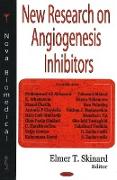New Research on Angiogenesis Inhibitors
BücherAngebote / Angebote:
Angiogenesis -- the growth of new blood vessels -- is an important natural process occurring in the body, both for health and as related to disease. Angiogenesis occurs in the healthy body to help heal wounds and to help to restore blood flow to tissues after injury or insult. In females, Angiogenesis also occurs during the monthly reproductive cycle (to rebuild the uterus lining, to mature the egg during ovulation) and during pregnancy (to build the placenta, the circulation between mother and foetus). The healthy body controls angiogenesis through a series of "on" and "off" switches. The main "on" switches are known as angiogenesis-stimulating growth factors. The main "off switches" are known as angiogenesis inhibitors. When angiogenic growth factors are produced in excess of angiogenesis inhibitors the balance is tipped in favour of blood vessel growth. When inhibitors are present in excess of stimulators, angiogenesis is stopped. The normal, healthy body maintains a perfect balance of angiogenesis modulators. In general, angiogenesis is "turned off" by the production of more inhibitors than stimulators. Tumour angiogenesis is the proliferation of a network of blood vessels that penetrates into cancerous growths, supplying nutrients and oxygen and removing waste products. Tumour angiogenesis actually starts with cancerous tumour cells releasing molecules that send signals to surrounding normal host tissue. This signalling activates certain genes in the host tissue that, in turn, cause proteins to encourage growth of new blood vessels. This book examines its angiogenesis within the context of theory and its applications to cancer treatment.
Folgt in ca. 10 Arbeitstagen
